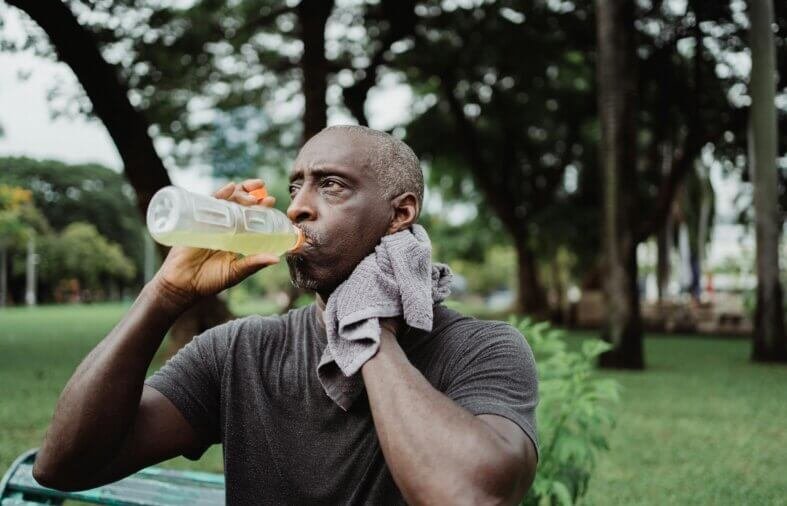In the realm of fitness and well-being, electrolytes are frequently discussed, yet many individuals only know the very minimum of what they actually are. Understanding the effects of electrolytes on your body may greatly improve your performance and recovery, whether you’re a professional athlete or just someone who loves staying active. This post will dive into seven reasonable points that are easily applicable.
Define electrolytes
When dissolved in water, electrolytes— elements with an electric charge— break apart into ions that support essential bodily functions. Included among them are sodium, potassium, calcium, magnesium, chloride, phosphate, and bicarbonate. Among numerous bodily functions, including nerve signaling, muscular contraction, and body water control, these minerals are absolutely vital. Your muscles can cramp, your energy levels might fall, and your performance might suffer without the proper balance of electrolytes.
Electrolytes’ Role in Performance
Your body sweats in vigorous exertion to cool itself down. You lose vital electrolytes, though, with that sweating. Your muscles may grow tired more quickly, and your capacity to function at your best decreases as your electrolyte levels fall. To keep their energy and endurance throughout lengthier workout sessions, athletes, therefore, frequently take sports beverages or electrolyte supplements. Good electrolyte balance guarantees that your muscles keep working efficiently, therefore enabling you to go the distance.
Electrolytes and Muscle Recovery
Your muscles typically hurt and are weary following a demanding exercise. Helping to lower muscular cramping, inflammation, and pain, electrolytes are essential for the healing process. Restoring lost minerals not only helps your muscles heal faster but also helps avoid the next-day fatigue. Apart from proper diet and hydration, maintaining electrolyte levels is essential to speeding up recovery.
Before or After Exercise
Many individuals question if they should be consuming electrolytes before or after a workout. The time and intensity of your workout will usually determine the answer. Taking electrolytes before you begin a high-intensity or endurance exercise will assist your body in being ready and avoiding early tiredness. On the other hand, if you feel exhausted or are sweating a lot afterwards, restoring electrolytes after exercise will help your body adequately rehydrate and speed up recovery. Pay close attention to symptoms like painful cramps, lightheadedness, or excessive thirst so you may tailor your adjustments to your specific needs.
Natural Electrolytes’ Sources
Although many people resort to commercial sports drinks for a fast fix, you can easily include lots of natural sources of electrolytes into your diet. Essential electrolytes are plentiful in foods such as bananas (heavy in potassium), dairy products (high in calcium), nuts and seeds (loaded with magnesium), and leafy greens. Another excellent natural drink with a reasonable mix of potassium and salt is coconut water. Eating a balanced diet high in these items can help you maintain your electrolyte levels without resorting to processed goods.
Signs of Potential Low Electrolyte Levels
Understanding when your body runs short on electrolytes will enable you to intervene before performance declines or recovery stops. Typical symptoms include headaches, nausea, tiredness, cramping of the muscles, dizziness, and an irregular heartbeat. If you have any of these symptoms, particularly following an exercise, it is quite likely that your electrolyte balance requires some adjustment. Maintaining your performance and overall health depends heavily on paying close attention to how you feel.
Determine Your Correct Electrolyte Balance
Everybody has unique physical characteristics. Your demand for electrolytes is influenced by age, exercise level, environment, and nutrition, among other things. People who work for long periods of time in hot weather will have different requirements than those who train for a shorter period of time indoors, say, thirty minutes. It’s also important not to overdo supplements, as excessive levels—especially sodium—can lead to issues like high blood pressure. Often a matter of trial and error, striking the ideal balance might be guided towards what is best for your body by occasionally visiting a fitness or healthcare specialist.
Conclusion
Anyone trying to maximize their performance and accelerate recovery must first understand the value of electrolytes. Paying attention to your electrolyte intake is a wise action, whether your main goal is to avoid cramps and tiredness or you should concentrate on electrolytes before or after exercise sessions. Recognizing the indicators of imbalance, selecting natural sources, and timing and amount that best fit your body’s demands can help you more efficiently power your exercises and recover quicker. Two little steps that pay off greatly are maintaining hydration and monitoring your electrolytes.








